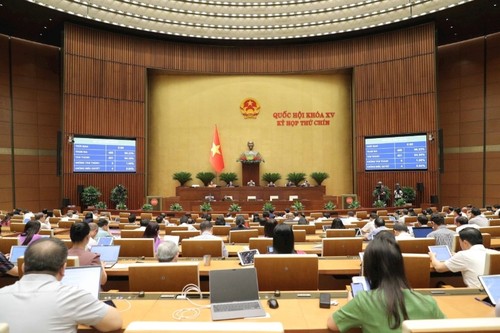 The Law on Teachers reflects Vietnam’s long-term vision for education (Photo: VOV) The Law on Teachers reflects Vietnam’s long-term vision for education (Photo: VOV) |
The Law on Teachers institutionalizes the Party and State’s recognition of the position, role, and professional characteristics of teachers within a unified legal framework.
Party and State’s consistent views on education
The Vietnamese Party and State have always considered teachers the most important, foundational, and decisive element in determining the quality of education. The Law establishes full legal status for teachers in public and non-public educational institutions. For the first time it recognizes non-public school teachers as professionals with equivalent rights, responsibilities, and standards, ending the practice of treating them as mere contract workers.
The Law stipulates that teachers’ salaries should rank at the highest level of the salary scale in the state administrative system and mandates the Government to set salary policies accordingly. In addition, teachers are entitled to specific allowances for responsibility, hardship, inclusive education, seniority, mobility, and other factors, to improve their overall income and professional well-being.
The Law expands support for teachers, giving priority in recruitment, transfer, and appointment of teachers working in remote, border, or island areas and incentives to attract highly qualified teachers in science, technology, digital transformation, and vocational education.
 (Photo: VGP) (Photo: VGP) |
Aligning with international standards
In the context of globalization, where knowledge is a strategic asset and innovation is a growth driver, strengthening the teaching workforce is vital. The Law on Teachers is aligned with global standards such as the 1966 UNESCO/ILO Recommendation concerning the Status of Teachers and the 1997 UNESCO Recommendation concerning the Status of Higher-Education Teaching Personnel. These documents stipulate the rights, obligations, and working conditions of teachers at all levels.
The Law demonstrates Vietnam’s commitment to achieving United Nations Sustainable Development Goal 4 of ensuring inclusive, equitable, and quality education and promoting lifelong learning for all.
UNESCO Chief Representative in Vietnam Jonathan Wallace Baker praised Vietnam’s adoption of the law, particularly the breakthrough provision that places teachers’ salaries at the top of the scale of the state administrative system. Mr. Baker said the strong consensus within the National Assembly in adopting the law reflects Vietnam’s strong commitment to investing in educators, who play the central role in education reform. According to Mr. Baker, by empowering teachers, Vietnam is narrowing gaps in educational access, improving learning outcomes, and building a more inclusive, resilient, and happy society.
Vietnam’s revolutionary history has proved education to be vital to national development. Article 61 of the 2013 Constitution declares education a top national policy, essential for improving public knowledge, developing human resources, and nurturing talent.
As Vietnam moves toward the 100th founding anniversary of the Party and the 100th founding anniversary of the country, high-quality human resources are seen as a strategic breakthrough.
The 10th Plenum of the 13th Party Central Committee in November 2024 identified educational reform and innovation as strategic breakthroughs and solutions for the nation’s future, to be continued by the 14th National Party Congress.
The passage of the Law on Teachers was a critical step in institutionalizing the Party's and State’s educational policies and a message to the international community about Vietnam’s respect for knowledge, its commitment to supporting teachers, and its readiness to work toward a future of sustainable learning.